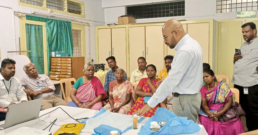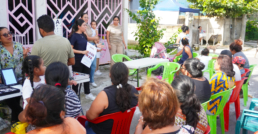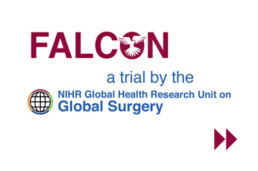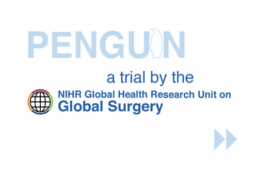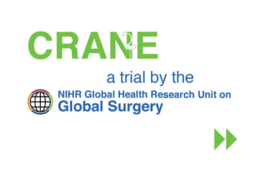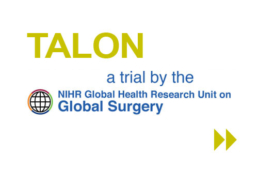The CHEETAH Trial
The cluster randomised trial of sterile glove and instrument change at the time of wound closure to reduce surgical site infection. A trial in low and middle income countries (LMICs)
Improving surgical outcomes through collaborative research
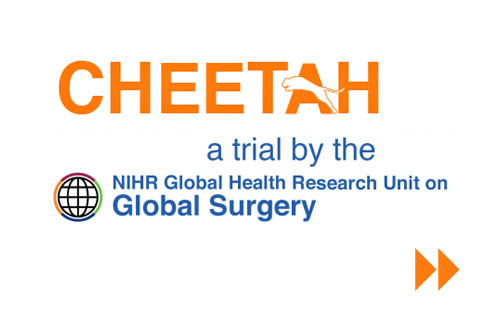

CHEETAH is an international, multicentre, 2-arm, cluster randomised controlled trial with an internal pilot to evaluate the use of separate sterile gloves and instruments for wound closure to reduce SSI rates in patients undergoing surgery with an abdominal incision.
Recruitment for this trial closed on the 31/03/2022 after 22 months – 2 months ahead of schedule.
Read the latest publication here. Previous publications can be found here.
CHEETAH is, after FALCON, the second global surgical trial from the NIHR-GSU network.
7
COUNTRIES
81
RANDOMISED HOSPITALS
0
ACTIVE HOSPITALS
(Trial now closed)
13331
PATIENTS RECRUITED
GSU Research Fellows, Staff Deliver Surgical Research Lectures in Nigeria
Surgery,News,CHEETAH,FALCON,Education and Training,Nigeria
October 26, 2023
Research fellows and staff of the NIHR Global Surgery Unit (GSU) visited Obafemi Awolowo University (OAU) in Ile Ife, Nigeria on the 14th-15th of September 2023.
0 Comments2 Minutes
India Hub Reaches Milestone of Training 500+ Practitioners in Wound Management
Surgery,News,CHEETAH,CEI,FALCON,India
September 21, 2023
India reaches key milestone in the Unit's vision to influence the healthcare landscape using results generated in GSU trials, across the Punjab region.
0 Comments2 Minutes
Mexico Hub Travels to Mata Cocuite for Wound Infection Prevention Talks
Surgery,News,CHEETAH,CEI,FALCON,Mexico
September 20, 2023
GSU team continue their rollout of community engagement and involvement (CEI) activities in the Veracruz region during a State Department health bridge for local residents.
0 Comments2 Minutes
Background
Surgical site infection (SSI) represents a major burden for patients, doctors and health systems around the world, but is potentially preventable. SSI is the most common postoperative complication across all income and development settings, and the most common healthcare-associated infection in low-and middle-income countries (LMICs). It has been associated with one-third of postoperative deaths and accounts for 8% of all deaths caused by a nosocomial infection. Rates vary significantly between different types of surgery, but it is particularly prevalent in abdominal operations; as many as one in four patients get an SSI when the operation involves the bowel.
Improving surgical outcomes is a global health priority, highlighted by the Lancet Commission on Global Surgery. Recent WHO guidelines made 29 recommendations for intraoperative and postoperative measures to prevent SSI. Despite inclusion of strongly graded recommendations, there was little high-quality evidence in support of most interventions. In addition, none of the evidence used was derived from resource limited settings, leading to uncertainty about implementation of measures in LMICs, in particular. The specific interventions to be tested in this study were selected by a Delphi process from a long list of potential interventions based on the the WHO guidelines.
A key factor influencing SSI rates is intraoperative contamination (opening the gut, genital or urinary tracts). In clean (non-contaminated) surgery, the infection rate is low and benefits from research targeting SSI rates in those patients are limited. CHEETAH will therefore focus on clean-contaminated, contaminated and dirty surgery. A cluster randomised design is considered the most appropriate design to minimise the risk of contamination in the control arm of the trial. Once theatre staff have been trained to implement the intervention (of separating sterile surgical instruments and gloves at the time of wound closure) it is likely to become routine practice, making individual randomisation unfeasible.
Aims & Objectives
Primary Objective
The primary objective of the CHEETAH RCT is to assess whether the practice of using separate, sterile gloves and instruments to close wounds at the end of surgery can reduce surgical site infection at 30-days post-surgery for patients undergoing clean-contaminated, contaminated or dirty abdominal surgery, compared to current routine hospital practice.
Secondary Objective
The secondary objective of the CHEETAH RCT is to assess the impact of changing gloves/instruments prior to wound closure compared to current routine hospital practice on secondary clinical outcomes up to 30 days post-surgery including: SSI during the in-hospital stay, re-admission, re-operation, length of hospital stay, return to normal activities, and death.
The recruitment target is a total of 12,800 participants from 64 clusters (hospital), each including up to 200 participants.
Surgical site infection (SSI) represents a major burden for patients, doctors and health systems around the world, but is potentially preventable. SSI is the most common postoperative complication across all income and development settings, and the most common healthcare-associated infection in low-and middle-income countries (LMICs). It has been associated with one-third of postoperative deaths and accounts for 8% of all deaths caused by a nosocomial infection. Rates vary significantly between different types of surgery, but it is particularly prevalent in abdominal operations; as many as one in four patients get an SSI when the operation involves the bowel.
Improving surgical outcomes is a global health priority, highlighted by the Lancet Commission on Global Surgery. Recent WHO guidelines made 29 recommendations for intraoperative and postoperative measures to prevent SSI. Despite inclusion of strongly graded recommendations, there was little high-quality evidence in support of most interventions. In addition, none of the evidence used was derived from resource limited settings, leading to uncertainty about implementation of measures in LMICs, in particular. The specific interventions to be tested in this study were selected by a Delphi process from a long list of potential interventions based on the the WHO guidelines.
A key factor influencing SSI rates is intraoperative contamination (opening the gut, genital or urinary tracts). In clean (non-contaminated) surgery, the infection rate is low and benefits from research targeting SSI rates in those patients are limited. CHEETAH will therefore focus on clean-contaminated, contaminated and dirty surgery. A cluster randomised design is considered the most appropriate design to minimise the risk of contamination in the control arm of the trial. Once theatre staff have been trained to implement the intervention (of separating sterile surgical instruments and gloves at the time of wound closure) it is likely to become routine practice, making individual randomisation unfeasible.
To assess whether the practice of using separate sterile gloves and instruments to close wounds at the end of surgery compared to current routine hospital practice can reduce surgical site infection at 30-days post-surgery for patients undergoing clean-contaminated, contaminated or dirty abdominal surgery.
CHEETAH is an international, multicentre, 2-arm, cluster randomised controlled trial, with an internal pilot. Clusters are defined as hospitals, which means hospitals rather than patients are randomised.
Patients (adults and children) undergoing emergency or elective abdominal surgery for a clean-contaminated, contaminated or dirty operation.
The intervention used within CHEETAH is:
Change of gloves and use of separate, sterile instruments before closing the abdominal wall
Comparator (current routine hospital practice):
No change of gloves or use of separate, sterile instruments before closing the abdominal wall

The CHEETAH trial has a 12 month internal pilot of 12 clusters and approximately 600 participants to assess:
- Whether hospitals adhere to their allocation
- What proportion of patients who are eligible for CHEETAH can be followed up successfully at 30 days after their surgery
Countries:
- LMICs defined by the Development Assistance Committee (DAC) Official Development Assistance (ODA) list where there are at least 4 eligible hospitals per country
- At least four eligible hospitals per country
Hospitals (clusters):
- Hospitals where glove and instrument change is not currently routine hospital practice
Participants:
a. Emergency (surgery on an unplanned admission) or elective (surgery on a planned admission)
b. Intraoperative finding of clean-contaminated, contaminated or dirty surgery
c. With at least one abdominal incision that is ≥5cm
- Patients aged xx years and over on the day of surgery. NB: This criteria must be made country-specific. This will be dependant on country-specific regulatory approvals.
Sponsor
The University of Birmingham (UoB) is the sponsor of the CHEETAH trial in collaborating countries.
International Coordinating Centre
The International Coordinating Centre CHEETAH trial office is at the University of Birmingham Clinical Trials Unit (BCTU).
Each country will appoint a National Coordinating Investigator (NCI) and a National Coordinating Centre (NCC) – the Hub – who will take national responsibility for the study. The Hubs will be responsible for coordinating recruitment from a range of representative local hospitals – spokes.
Central and National Trial Management Group
The Central Trial Management Group (CTMG) includes those individuals responsible for the day-to-day management of the trial. This will include the trial CI, lead methodologists, patient representatives and CHEETAH central trial management staff.
Trial Steering Committee
The Trial Steering Committee provides overall supervision of the trial and ensures that the trial is being conducted in accordance with the principles of Good Clinical Practice and other relevant regulations.
Data Monitoring Committee
The Data Monitoring Committee will give advice on whether the accumulated data from the trial, together with the results from other relevant research, justifies the continuing recruitment of further participants.
Central Trial Management Group (University of Birmingham)
CHEETAH Trial Team
Birmingham Clinical Trials Unit, Public Health Building
University of Birmingham, Edgbaston, B15 2TT
Email: Cheetah@trials.bham.ac.uk
Tel: from UK 0121 415 9103, International +44121 415 9103
Twitter: @cheetahRCT



